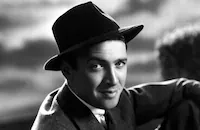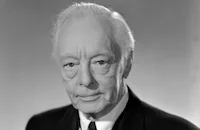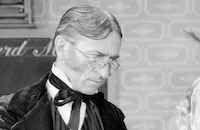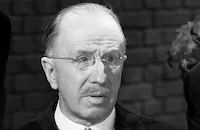Made for Each Other

Brief Synopsis
Cast & Crew
John Cromwell
Carole Lombard
James Stewart
Charles Coburn
Lucile Watson
Eddie Quillan
Film Details
Technical Specs

Synopsis
Young New York attorney John Mason marries Jane after a brief courtship, incurring the displeasure of his boss, Judge Doolittle, who had hoped that John would marry his daughter Eunice. John's mother, Mrs. Mason, also disapproves of the match, for she had wanted her son to marry the boss's daughter. After their honeymoon is preempted by a court case, the newlyweds move into their new apartment and invite John's overly critical mother to live with them. Although voted the most likely to succeed in his law class, John soon finds his promise dimming as he is unfairly passed over for a partnership in Doolittle's law firm. When baby John is born, financial pressure builds, and Jane pushes for her husband to ask for a raise, but before he can make his plea, the judge bulldozes him into accepting a twenty-five percent pay cut. As bills mount, Jane is forced to look for work and let their maid Lily go, causing more strain between her and her mother-in-law over domestic chores. Tensions in the Mason household increase, causing an estrangement between John and Jane. On New Year's Eve, the Masons reach their nadir. While Jane and John attend a party at a night club, they decide to separate. When Jane sadly calls home to talk to her mother-in-law about the baby, who has had a slight cold, she learns that the child has fallen critically ill. When they take the baby to the hospital, they are told that the baby has almost no chance to live if it does not receive a special serum. Because local suppplies are low, the only place where the doctors can locate the serum is in Salt Lake City, which is snowed in by a blizzard. Desperate, John turns to Judge Doolittle who is touched by John's plight and offers the five thousand dollars demanded by the pilot, Conway, to deliver the medicine. As news of the mercy flight reaches the radio and newspapers, thousands of people await the arrival of the serum. The storm is so severe that Conway has to parachute out of his plane before it crashes. Though his leg is broken, Conway makes it to a farm house and the serum is transported to New York just in time to save the baby. Some time later, John is made partner and John, Jr. delights Judge Doolittle and the other partners with his first word.

Director

John Cromwell
Cast

Carole Lombard

James Stewart

Charles Coburn

Lucile Watson

Eddie Quillan
Alma Kruger
Ruth Weston
Donald Briggs

Harry Davenport
Esther Dale

Russell Hopton

Ward Bond

Olin Howland

Fern Emmett

Louise Beavers
Bonnie Belle Barber
Jackie Taylor
Renee Orsell
Mickey Rentschler
Wilhelmina Morris

Nella Walker
Marjorie Wood
Ethel Marical
Harlan Briggs

Arthur Hoyt
Monte Collins
James Mcnamara
John Picorri
Ruth Gillette

Ivan Simpson
Ed Deering
Robert Elliott
Jack Mulhall
Gary Owen
Carlyle Moore
Russ Clark
Arthur Gardner
Mike Killian
John Austin
Harry North
J. M. Sullivan
Raymond Bailey
Mary Field
Lane Chandler
Tom London
Betty Farrington
Robert E. O'connor
Robert Strange
Perry Ivins
Gladden James
Edwin Maxwell
Harry Depp
Fred Fuller
Crew
Travis Banton
Edward G. Boyle
Jack Cosgrove
Lillian K. Deighton
Lou Forbes
Rose Franklin
Hal C. Kern
William Cameron Menzies
James E. Newcom
Jack Noyes
Frank Ryan
David O. Selznick
Leon Shamroy
Eric Stacey
Jo Swerling
Lyle Wheeler

Videos
Movie Clip



Film Details
Technical Specs

Articles
Made for Each Other
Directed by John Cromwell from a script by Jo Swerling, Made for Each Other is a simple story of a young, newlywed couple struggling with money, baby, and in-law problems. For the part of Lombard's husband, Selznick borrowed James Stewart from MGM. Selznick believed Stewart had just the right amount of screen presence to complement Lombard but not overwhelm her. (In fact, Selznick feared that Lombard might overwhelm Stewart on screen, if anything.)
The two stars got along well. Stewart later called Lombard "the only girl I've ever known who could let out a stream of four-letter words and not embarrass you. In fact, I'd have to say it was ladylike the way she did it." For her part, Lombard said that Stewart's "talent is perfection itself." Director Cromwell praised Lombard as "just a joy" to work with, "a wonderful gal," and soon directed her again in In Name Only (1939), another drama.
Author Marc Eliot has written that for a scene in which Stewart had to cry, the actor resorted to an old trick after Cromwell was unable to talk him into generating real tears: "Stewart took a break, slipped outside the studio, lit a cigarette and... held it close to his face, to allow the smoke to burn his eyes."
David Selznick was so busy with Gone With the Wind at this time that he left Cromwell largely unsupervised. But a preview screening went badly, and Selznick briefly turned his attention to re-editing the film and expanding a climactic sequence in which emergency serum must be flown through a raging blizzard to New York City in order to save a baby's life. Cromwell fought with Selznick over this sequence, but Selznick prevailed, explaining that it was actually quite realistic since a similar scenario had unfolded when Selznick's brother Myron needed special medicine flown quickly to Los Angeles. (It arrived without a moment to spare.)
In his advertising campaign for the film, Selznick played up the "new" Carole Lombard: "CAROLE CRIES! It's a David O. Selznick stroke of showmanship to make Lombard go dramatic!"
The picture opened in early 1939 to excellent reviews. Trade paper Variety called it "an exquisitely played, deeply moving comedy-drama... A happy combination of young love, sharp clean-cut humor and tearjerker." Frank Nugent of The New York Times deemed it "thoroughly delightful, richly human, comic, sentimental and poignant by turns... The story of almost every young couple that ever was or will be." And Time magazine declared, "This mundane, domestic chronicle has more dramatic impact than all the hurricanes, sandstorms and earthquakes manufactured in Hollywood last season." The film also made The New York Times' Ten-Best list at the end of the year, a significant achievement for Hollywood's golden year of 1939.
Despite the good press, however, Made for Each Other was a box-office dud. And while Lombard may not have gotten the part of Scarlett O'Hara, she did win Gone With the Wind's leading man: she married Clark Gable soon after Made for Each Other's release. They were still married when Lombard perished in a 1942 plane crash, at age 33.
Director: John Cromwell
Screenplay: Jo Swerling (screenplay); Rose Franken (suggested by a story by); Frank Ryan (contributor: humorous situations, uncredited)
Cinematography: Leon Shamroy
Art Direction: Lyle Wheeler
Music: Oscar Levant
Film Editing: James E. Newcom
Cast: Carole Lombard (Jane Mason), James Stewart (John Horace Mason), Charles Coburn (Judge Joseph M. Doolittle), Lucille Watson (Mrs. Harriet Mason), Eddie Quillan (Conway), Alma Kruger (Sister Madeline), Harry Davenport (Dr. Healy), Esther Dale (First Cook), Louise Beavers (Third Cook), Ward Bond (Jim Hatton), Milburn Stone (Newark Official).
BW-91m.
By Jeremy Arnold
Sources:
Donald Dewey, James Stewart
Marc Eliot, Jimmy Stewart: A Biography
Wes D. Gehring, Carole Lombard
Leonard Maltin, Carole Lombard

Made for Each Other
Quotes
Never let the seeds stop you from enjoying the watermelon.- Lily
That's alright if you've got a watermelon.- Jane
You mustn't say that, Miss Mason. You've got your watermelon, but you chokes yourself up on all the little seeds. I always say "Spit 'em out before they spoil your taste for the melon."- Lily
Trivia
David O. Selznick's experience of trying to have life-saving serum flown in for his critically ill brother was the basis for the flying sequences ending the movie.
Special effects technician Edmund E. Fellegi was killed when he fell from a 40-foot catwalk while releasing balloons for the New Year's Eve party scenes.
Seven actors listed in records for this movie were not seen in the final print. These are (with their character names) Jack Mulhall (Rock Springs Radio Operator), Arthur Gardner (Iowa City Radio Operator), John M. Sullivan (John Hopkins Chemist), John Austin (Allentown Radio Operator), and the three Doctors, Robert Strange, Perry Ivins and Gladden James.
Notes
According to an article in Life, the serum flying sequence in this film was based on an actual incident in which producer David O. Selznick attempted to have serum flown from New York for his critically ill brother Myron, who had pneumonia. A news item in Hollywood Citizen-News reports that Edmund E. Fellegi, a special effects technician, plunged to his death from a forty foot catwalk from which he was releasing balloons for the New Year's Eve party scenes in this picture. Oscar Levant, in his autobiographical writings, states that he gave Selznick some musical material for this film. In February 1940, Carole Lombard and Fred MacMurray appeared in a Lux Radio Theatre version of this story, and in December 1945, James Stewart and Marsha Hunt appeared in another Lux Radio Theatre version.














